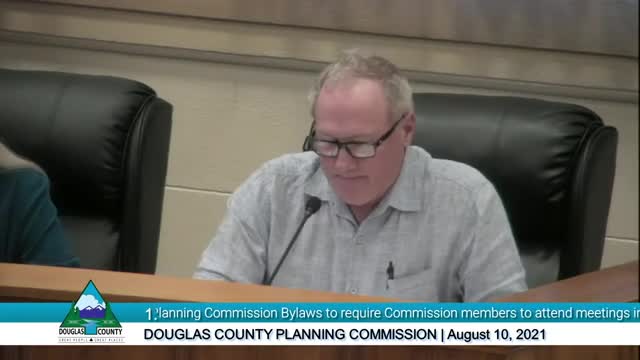Douglas County planning commissioners debate requiring in-person attendance, stop short of a vote
Get AI-powered insights, summaries, and transcripts
Subscribe
Summary
Planning commissioners debated calls to require in-person attendance for meetings and whether virtual access reduces public participation. Commissioners heard public comment urging virtual access to broaden participation, but took no formal action on Maureen's proposed bylaw amendment.
The Douglas County Planning Commission discussed whether to amend its bylaws to require commissioners to attend meetings in person, but did not take a formal vote.
Commissioner Maureen read the item into the record as a policy question and framed the issue around Nevada open-meeting law, saying, “This is strictly a policy decision on the part of the planning commission.” She said she believes in public, in-person interaction for transparency and accountability, but acknowledged exceptions for travel or health reasons.
Commissioner Christie, speaking remotely, countered that limiting virtual access reduces participation. “When we went back to in person participation only, we went back to excluding a large portion of our community from participating in their local government,” Christie said, arguing the pandemic demonstrated how virtual meetings expanded access for working and younger residents.
Public commenters weighed in on both sides. Longtime local activist Jim Slade said the planning commission should require members to attend in person, but that the public also should have remote participation options. “I believe that that is in the public interest,” Slade said. Michael Avila, a resident, urged the commission to keep the virtual option to address affordability and scheduling barriers for working families.
Commission discussion ranged from the value of face-to-face deliberation to whether a camera-on requirement for remote participants would address concerns about reading facial expressions. Commissioners also noted technical and health accommodations may be necessary for some members.
Chair Brian Walder closed the item without a motion after no commissioner moved to amend the bylaws and said the commission would move to the next agenda item. With no formal motion, the matter was left for future discussion rather than a referral to the Board of County Commissioners.
The debate highlighted a split between commissioners who favor returning to in-person meetings to support public visibility and those who see virtual access as an important tool to broaden civic participation and inclusion.
